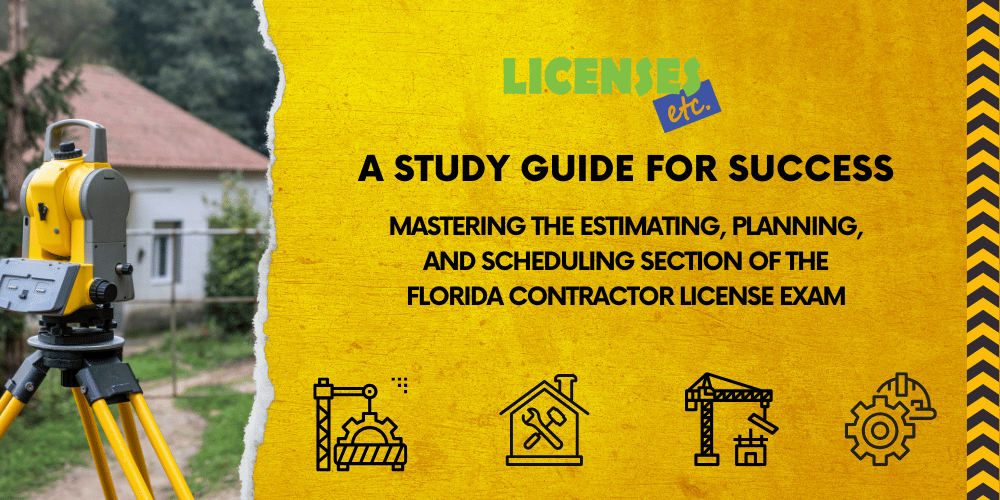- November 15, 2024
- Posted by: admin
- Category: Florida Contractor License Exams

Embarking on the journey to become a licensed contractor in Florida is a significant endeavor. At LicensesETC, we understand that the path to certification requires diligent preparation, particularly when it comes to the Estimating, Planning, and Scheduling section of the Florida Contractor License Exam. This crucial component not only tests your abilities but also sets the foundation for successful project management in your contracting career. Here’s your comprehensive guide to navigating this section with confidence.
What Does the Estimating, Planning, and Scheduling Section Cover?
This section is designed to evaluate your proficiency in key areas critical to construction project management. Here’s what you’ll encounter:
Cost Estimation
Learn to prepare accurate cost estimates, which are integral to project bidding and financial planning. Understanding direct and indirect costs, labor, materials, equipment, and contingency allowances is essential.
Unit Cost Estimating:
This technique involves calculating costs based on the price per unit for materials, labor, and equipment. By breaking down each component to its smallest unit, contractors can ensure more precise cost projections, essential for competitive bidding and budget adherence.
Detailed Quantity Takeoffs:
This involves a meticulous analysis of project plans and blueprints to determine the exact quantities of materials needed. Accurate takeoffs are crucial in avoiding over- or under-ordering, which can lead to project delays and increased costs.
Tips for Studying:
- Use Case Studies: Analyze real-world projects to understand how seasoned contractors approach estimating.
- Simulation Software: Engage with software tools that mimic estimating scenarios, providing hands-on experience with cost projections and adjustments.
Project Planning
Familiarize yourself with the development of project plans that outline the scope, timeline, and resources required. Effective planning minimizes risks and ensures projects are executed smoothly.
Work Breakdown Structures (WBS):
Creating a WBS involves dividing a project into smaller, manageable sections or tasks. This approach facilitates detailed planning, resource allocation, and tracking, ensuring each aspect of the project is aligned with the overall objectives.
Risk Management Strategies:
Identifying potential risks and developing mitigation strategies is a cornerstone of effective planning. This proactive approach helps in anticipating challenges and devising solutions before they escalate into major issues.
Tips for Studying:
- Interactive Workshops: Participate in planning workshops that focus on developing WBS and risk management plans.
- Mock Projects: Create mock project plans to test your ability to integrate all elements, from resource allocation to risk assessment.
Scheduling Techniques
Master various scheduling methodologies, such as Gantt charts, Critical Path Method (CPM), and Program Evaluation and Review Technique (PERT). These tools help in planning task sequences and managing project durations efficiently.
Resource Leveling:
This technique involves adjusting the start and finish dates of tasks to align resource usage with availability. It helps in managing workforce and equipment efficiently, preventing over-commitment and ensuring steady workflow.
Critical Chain Project Management (CCPM):
CCPM focuses on resource management and task scheduling, emphasizing the importance of buffer periods to absorb potential delays. This method enhances flexibility and responsiveness, crucial for maintaining project timelines.
Tips for Studying:
- Simulation Tools: Use scheduling software to experiment with different techniques and understand their impact on project timelines.
- Peer Collaboration: Engage with peers in study groups to discuss scenarios and explore various approaches to scheduling challenges.
Overall Key Topics to Study
To excel in this section, focus on the following topics:
-
Construction Documents: Gain a thorough understanding of blueprints, specifications, and other contract documents. This knowledge is crucial for accurate estimation and effective project planning.
-
Resource Allocation: Study methods for distributing labor and materials efficiently across project timelines. This involves understanding resource leveling and smoothing techniques.
-
Time Management: Develop skills to prioritize tasks and manage time effectively. This includes recognizing potential bottlenecks and implementing strategies to mitigate delays.
Best Practices for Exam Preparation
-
Review Sample Questions: Familiarize yourself with the exam format by practicing with sample questions. This helps identify areas where additional study is needed.
-
Utilize Study Materials: Invest in reputable study guides and resources that cover the Estimating, Planning, and Scheduling section comprehensively. Online courses and workshops can also provide valuable insights.
-
Practice Time Management: During your study sessions, practice managing your time effectively. Simulate exam conditions to improve your ability to complete questions promptly.
-
Join Study Groups: Collaborate with peers to discuss challenging topics and share resources. Group studies can provide diverse perspectives and enhance understanding.
-
Seek Professional Guidance: Consider enrolling in preparatory courses offered by professional organizations or tutors specializing in the contractor exam.
The Importance of Mastering These Skills
Successfully navigating the Estimating, Planning, and Scheduling section is not just about passing the exam; it’s about empowering yourself with the skills essential for effective project management. Accurate estimation ensures competitive and profitable bidding, while robust planning and scheduling facilitate smooth project execution. Mastering these skills will enable you to deliver projects on time and within budget, enhancing your reputation and success in the contracting industry.
At LicensesETC, we’re committed to supporting your journey toward becoming a licensed contractor in Florida. Equip yourself with the knowledge and tools needed to excel in the Estimating, Planning, and Scheduling section, and take a confident step closer to achieving your professional goals.
